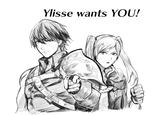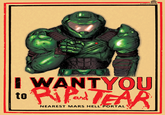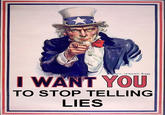Uncle Sam's "I Want You" Poster
Part of a series on War Propaganda Parodies. [View Related Entries]
About
The "I Want You" Poster refers to the American war propaganda bill featuring the iconic image of Uncle Sam pointing his finger at the reader that was widely used to recruit soldiers during both World War I and World War II. Due to the massive scale of its distribution across the U.S. during the first half of the 20th century, the poster still remains culturally relevant to this day as one of the most recognizable American relics from the era.
Origin
"Lord Kitchener Wants You"[1] (below, left) was a wartime recruitment and propaganda poster created by the British Parliamentary Recruiting Committee in September 1914, based on a cover illustration (below, right) designed by the graphic artist Alfred Leete[2] earlier that year for the London Opinion magazine.


It soon became the most famous product of the British propaganda campaign of World War I, and was the inspiration for the Uncle Sam recruitment poster.
Uncle Sam
Uncle Sam[3] is the national personification of the United States and sometimes more specifically of the American government. Although the first recorded use of the name "Uncle Sam" dates back to 1775 during the Revolutionary War, the appearance which is most commonly associated with him in modern times was created in 1917 by the American artist James Montgomery Flagg[4] as propaganda for the USA's entry into World War I. Based on the Lord Kitchener recruitment poster, it has since become the most well-known derivation and a symbol for propaganda.

He is depicted as a stern elderly white man with white hair and a goatee beard, and dressed in clothing that recalls the colors and design of the flag of the United States – typically a top hat with white stars on a blue band, a red bow tie, and a blue coat.
Spread
From 1914 to the 1980s, the meme was spread almost solely in the form of imitations by artists looking to use it for serious purposes such as propaganda and raising public awareness of certain issues. The popularity and effectiveness of both the original Lord Kitchener poster and the newer Uncle Sam poster lead to the creation of dozens of imitations and derivations in the decades afterwards, transcending countries and languages. A real-life variation of this meme is typically easy to identify due to the universal usage of a person with their finger pointed towards the viewer, often followed by a caption encouraging the viewer to support a cause.



Parodies were not unheard of, although they were generally used to advance political agendas rather than being made purely for humor; the example below was created in the 1970s[5] as an anti-war retort to the original Uncle Sam recruitment poster. After the popularity of the internet surged, the meme was quickly adopted by the online community.

Although it had already been popular in real life for decades, the rise of the internet brought with it a renaissance for the meme. The most popular form of the meme is when Uncle Sam is replaced by a well-known character or person (see Notable Examples), but the original Uncle Sam poster is also frequently modified (template below).

Examples






Search Interest
Search interest relating to the meme has remained steady over the years, although there was a notable peak in interest regarding Lord Kitchener around 2004.
External References
[1] Wikipedia – Lord Kitchener Wants You
[2] Wikipedia – Alfred Leete
[4] Wikipedia – James Montgomery Flagg
[5] Go Banking Rates – 15 Decades of Depictions of Uncle Sam
[6] Library of Congress – The Most Famous Poster
[7] TVTropes – Uncle Sam Wants You
[8] Says-It.com – Uncle Sam Poster Generator













